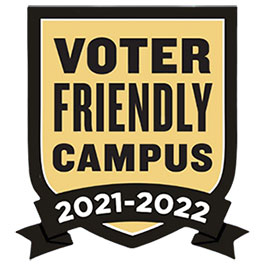For a second straight election cycle, Oakland University has been designated a “Voter Friendly Campus” by the Fair Elections Center’s Campus Vote Project (CVP) and NASPA – Student Affairs Administrators in Higher Education. The designation is valid through December 2022.
The mission of the Voter Friendly Campus initiative is to boost efforts that help students overcome barriers to participating in the political process. OU was evaluated based on its plan to register, educate, and turn out student voters in the 2020 election.
“To get the designation of a Voter Friendly Campus, we had to submit an action plan early in 2020 detailing our planned election engagement work for the election season, and then report on those efforts after implementing the plan for the general election,” said David Dulio, professor of political science and director of OU’s Center for Civic Engagement.
The plan included information on OU’s interest in being a Voter Friendly Campus and the leadership that would help execute the plan, Dulio added. It was focused on four key areas: Voter Registration, Voter Education, Voter Turnout, and Students as Voter Advocates.
Over the past year, OU’s Center for Civic Engagement has supported a range of events and initiatives, including a voter registration and absentee ballot video in collaboration with Film Studies and Production students; a Civic Engagement Office Hours Virtual Series that focused on Campaign 2020; and a virtual discussion with pollster and political strategist Stanley Greenberg on the topic of “Understanding the Politics of Macomb County in Presidential Elections.”
In addition, the Center for Civic Engagement and Oakland University Student Congress worked together to coordinate voter registration efforts and debate watch parties ahead of the 2020 election. Jeremy Johnson, OUSC director of civic affairs, said that when the pandemic struck, organizers relied on virtual means to connect with students.
“We pivoted to a social media and electronic campaign to try to get students to register to vote,” Johnson said. “We made numerous posts on social media, implemented voter registration into the class registration system at OU, made physical postings for voter registration and partnered with outside student organizations to relay the message.”
The debate watch parties brought students together virtually and generated lively discussion during and after the events. Johnson also worked on a number of other efforts to facilitate civic participation. These include working with OU’s Office for Student Involvement to provide free postage stamps, thus eliminating a potential barrier to mail-in voting; coordinating a Black Lives Matter march as part of a “get out the vote” effort; and partnering with OU Housing to implement voter engagement training for employees.
According to Johnson, one of the best ways to improve one's community is through the democratic process. This makes increasing education and participation in politics vitally important for building a more engaged OU community, he noted.
“A lot of students feel left out of the political process and feel unheard by their representatives, so bringing them into the conversation is beneficial for them and for democracy as a whole,” Johnson said. “Our entire strategy for civic engagement is founded on the idea that the more engaged the students are with civic life – which extends beyond voting – the better leaders they can become and the better leaders we will have in office.”
The Voter Friendly Campus designation program was started through the partnership of Campus Vote Project and NASPA in 2016. The goal of the program is to help institutions develop plans to coordinate administrators, faculty, and student organizations in civic and electoral engagement. For more information about all the institutions that received the Voter Friendly Campus designation for 2020-2021, visit voterfriendlycampus.org.

